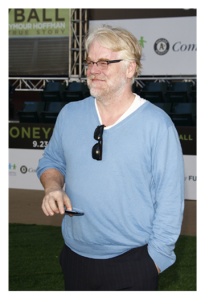By Avidan Milevsky, PhD
 We give lip service to the price of fame, but many of us don’t think about what it really means until tragedy is splashed across our media. The recent death of Philip Seymour Hoffman is yet another chapter in the continuous narrative of celebrities who self-destruct.
We give lip service to the price of fame, but many of us don’t think about what it really means until tragedy is splashed across our media. The recent death of Philip Seymour Hoffman is yet another chapter in the continuous narrative of celebrities who self-destruct.
From his many movies, we can attest to the award-winning actor’s talent and intuition, and from those who knew Mr. Hoffman, it seems he was a genuine and kind person. When we learn of the premature death of a Hollywood star, we should look beyond the sensationalism and statistics. We should focus on the fact that parents are grieving, children are grieving, friends are grieving.
Unfortunately, when addiction is involved, the public is quick to succumb to the blame game, pointing fingers at the individual or their family for bad decisions. Although this may temporarily make us feel better about our own lives, alleviating our fear by telling ourselves that this only happens to “them”, this naive approach is born from a profound lack of understanding the complex nature of drug abuse. This isn’t news to the millions who wrestle with anguish and feelings of helplessness as they try to help loved ones who suffer from addiction. With a dose of empathy rather than blame, we can take lessons from these tragedies, and educate ourselves about the process that leads to such sorrowful ends.
Consider the unfortunate tales of Lindsey Lohan, Justin Bieber, and the deaths of Michael Jackson, Cory Monteith, Philip Seymour Hoffman and so many others. These are stories that may have ended with drug abuse, but began with a different type of drug – the desire to be famous.
Ask children from a very young age what they want to be when they grow up and you will hear various answers, all with a common core: the need for fame. From movie star to rock star to playing in the NFL, we are obsessed with fame. The life goals of our youth, especially, seem centered on fame.
We may imagine fame to deliver a glamorous lifestyle and special treatment. We may also recognize the potentially hazardous opportunities and tremendous pressures that encourage problematic behaviors, including substance abuse and addiction.
However, other factors may combine with fame to produce the dramatic endings we so often hear about. First, those obsessed with seeking fame may be exhibiting psychological issues at the get-go. For example, an intense need to be adored by fans may be the product of unwholesome family dynamics and lack of love early in life. Second, fame begets free-flowing funds, and the challenge of staying healthy with so much privilege is a well-known phenomenon.
If you add new-found wealth to already existing unhealthy interpersonal dynamics, we are witness to stories of family infighting, all for the sake of a piece of the money pie.
 Are there other aspects of fame we might want to examine? If fame comes at an early age or too quickly, is the celebrity more at risk for addiction and destructive behaviors?
Are there other aspects of fame we might want to examine? If fame comes at an early age or too quickly, is the celebrity more at risk for addiction and destructive behaviors?
Along with the obvious issues of living life in the spotlight, internal factors may be harder to pinpoint and study. They can be powerful forces in this lethal mix. What does it do to a person’s self-image to have millions of people obsessed with them? What happens to a person’s internal reward system to have unlimited money and the ability to purchase whatever is desired? What is it like experiencing an invasion of privacy by the paparazzi on a daily basis?
Too often, the combination of these psychological and situational elements yields terrible outcomes.
Once we place an individual on the “fame track,” how do we prevent the train wreck? As a Hollywood up-and-comer begins to enjoy success, it is unrealistic to imagine him or her saying “it’s been nice but anything more can lead to disaster”. It is too tempting to reach out for that next, bigger role – and everything that comes along with it. How many actors or other celebrities are able to enjoy the ride but recognize when fame is becoming destructive?
The tragic deaths of Michael Jackson, Cory Monteith, and Philip Seymour Hoffman are a clear illustration of the most extreme collision of internal and external forces in the celebrity lifestyle. Yet even when the price of fame does not exact the ultimate toll, stories of emotional disturbances, family conflict, and marital hostility are common in Hollywood – factors that may coalesce, at the very least, in years of struggle – in and out of the spotlight.
© Avidan Milevsky
Avidan Milevsky, PhD, is an Associate Professor of Psychology at Kutztown University of Pennsylvania and a psychotherapist at Wellspring counseling in Towson, MD. His research on families has produced over 100 conference presentations, and more than 20 papers in peer-reviewed journals, including a contribution to the Encyclopedia of Adolescence. His most recent book on siblings, Sibling Relationships in Childhood and Adolescence: Predictors and Outcomes, was published by Columbia University Press. Dr. Milevsky has been interviewed by national media about his work including stories in The Washington Post, The Wall Street Journal, The Associated Press, Real Simple, and Allure magazine. Additionally, Dr. Milevsky is a columnist for Psychology Today and The Huffington Post. You can learn more about his work at www.avidanmilevsky.com and follow him on Twitter @PsycReflections.
Image of Philip Seymour Hoffman, BigStockPhoto, OAKLAND, CA – SEPT 19: Philip Seymour Hoffman at the world premiere of Columbia Pictures’ ‘Moneyball.’
You May Also Enjoy
These are stories that may have ended with drug abuse, but began with a different type of drug – the desire to be famous.
That is a spot-on assessment. And that drug knows no geographic, racial or economic boundaries. My heart always goes out to those left in the wake of the destruction when such tragedies occur.
Good article.
I think a lot of it has to do with the fact that as a teenager going through puberty, even near the end (such as Justin) Ego really tends to show itself during those years.
I am a completely different person than I was at age 18, (I’m 25 now) and I see how many mistakes I made and how many people I hurt. In Justins case, I think it is just an adolescence in the spotlight and being addicted to it.
Jacob
Growing up in the spotlight. No thanks! But Justin will figure it all out, I have a hunch!